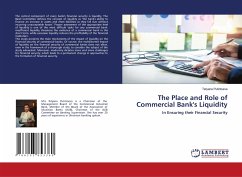The central component of every bank's financial security is liquidity. The Basel Committee defines the concept of liquidity as "the bank's ability to finance an increase in assets and meet liabilities as they fall due without incurring unacceptable losses". Proper assessment of the appropriate level of liquidity is one of the most difficult tasks for any commercial bank: insufficient liquidity threatens the existence of a commercial bank in the short term, while excessive liquidity reduces the profitability of the financial institution. This study presents the main mechanisms of the impact of liquidity on the financial security of commercial banks. Of course, the multifaceted impact of liquidity on the financial security of commercial banks does not allow, even in the framework of a thorough study, to consider the subject of the study exhausted. Moreover, modernity dictates more and more challenges for financial security, which leads to a permanent change in approaches to the formation of financial security.








